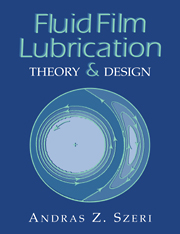Book contents
- Frontmatter
- Contents
- Preface
- 1 Introduction
- 2 Basic Equations
- 3 Thick-Film Lubrication
- 4 Dynamic Properties of Lubricant Films
- 5 Effects of Fluid Inertia
- 6 Flow Stability and Transition
- 7 Turbulence
- 8 Elastohydrodynamic Lubrication
- 9 Thermal Effects
- 10 Lubrication with Non-Newtonian Fluids
- 11 Gas Lubrication
- Index
1 - Introduction
Published online by Cambridge University Press: 12 January 2010
- Frontmatter
- Contents
- Preface
- 1 Introduction
- 2 Basic Equations
- 3 Thick-Film Lubrication
- 4 Dynamic Properties of Lubricant Films
- 5 Effects of Fluid Inertia
- 6 Flow Stability and Transition
- 7 Turbulence
- 8 Elastohydrodynamic Lubrication
- 9 Thermal Effects
- 10 Lubrication with Non-Newtonian Fluids
- 11 Gas Lubrication
- Index
Summary
The term tribology, meaning the science and technology of friction, lubrication, and wear, is of recent origin (Lubrication Engineering Working Group, 1966), but its practical aspects reach back to prehistoric times. The importance of tribology has greatly increased during its long history, and modern civilization is surprisingly dependent on sound tribological practices.
The field of tribology affects the performance and life of all mechanical systems and provides for reliability, accuracy, and precision of many. Tribology is frequently the pacing item in the design of new mechanical systems. Energy loss through friction in tribo-elements is a major factor in limits on energy efficiency. Strategic materials are used in many triboelements to obtain the required performance.
Experts estimate that in 1978 over 4.22 × 106 Tjoule (or four quadrillion Btu) of energy were lost in the United States due to simple friction and wear – enough energy to supply New York City for an entire year (Dake, Russell, and Debrodt, 1986). This translates to a $20 billion loss, based on oil prices of about $30 per barrel. Most frictional loss occurs in the chemical and the primary metal industries. The metalworking industry's share of tribological losses amount to 2.95 × 104 Tjoule in friction and 8.13 × 103 Tjoule in wear; it has been estimated that more than a quarter of this loss could be prevented by using surface modification technologies to reduce friction and wear in metal working machines. The unsurpassed leader in loss due to wear is mining, followed by agriculture.
- Type
- Chapter
- Information
- Fluid Film LubricationTheory and Design, pp. 1 - 52Publisher: Cambridge University PressPrint publication year: 1998



